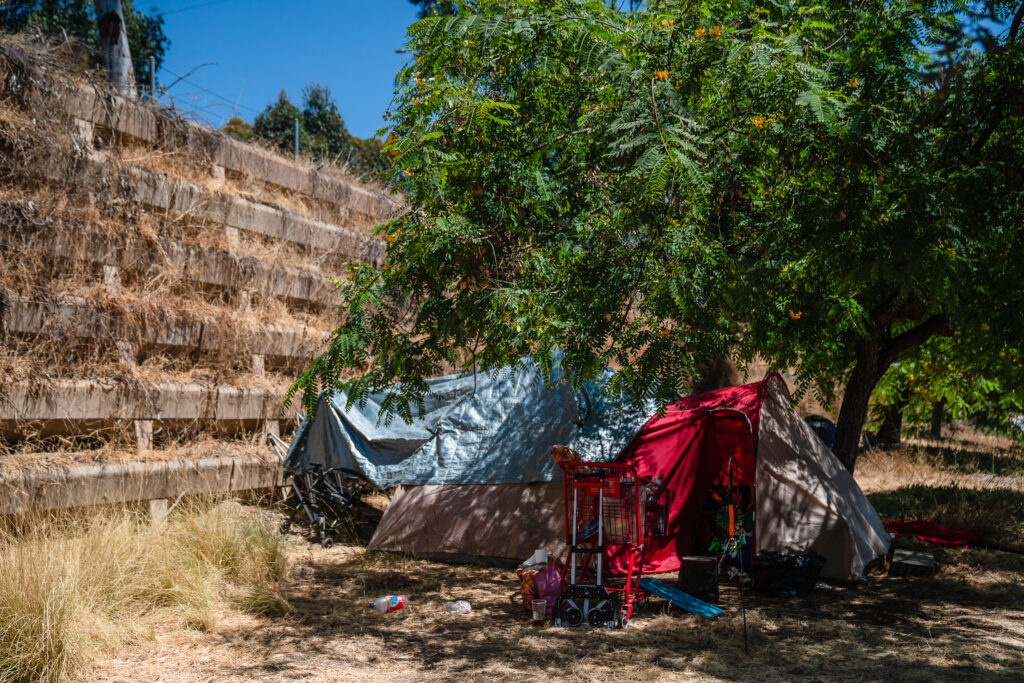For the first time since 2020, the region’s annual census shows a year-over-year decline in homelessness across San Diego County.
The Regional Task Force on Homelessness, which oversees the annual point-in-time count, tallied a 7 percent drop in both unsheltered and sheltered homelessness.
The Task Force also reported an overall 13.5 percent overall drop in homelessness in the city of San Diego and a 3.9 percent decrease in street homelessness. The group also cheered overall decreases in cities including Carlsbad, Chula Vista, Encinitas and Oceanside – and regionwide drops in homelessness among families, youth and veterans. Escondido and National City also saw drops in street homelessness.
Task Force CEO Tamera Kohler attributed the overall reductions to dynamics including state investments in Encampment Resolution Grants and more targeted services for groups including families and veterans. She noted that both cities with and without controversial homeless camping bans saw drops in homelessness. The bans have led some unsheltered people to move from place to place to avoid police.
“We saw a reduction across the region, in nearly every community,” Kohler said.
The outliers included El Cajon, which saw 21.6 percent year-over-year increase in street homelessness. Volunteers also counted more unsheltered people in Poway and Fallbrook, communities that historically have had very small homeless populations.
The drops that the Task Force found in most of the county don’t match up with other data points – and raise questions about the impacts of camping bans in cities including San Diego.
The Task Force separately reports a 3 percent spike in people accessing homeless services during the past federal fiscal year. The more than 23,000 people who received services is more than double the 9,905 counted during this January’s homeless census.
The gulf between those two numbers drives home the reality that the point-in-time count represents a minimum snapshot of the region’s homeless population.
During the same period, Task Force data also revealed the number of newly homeless San Diegans eclipsed the number of newly housed ones by about 4,200 people. That trend continued in January, the month that volunteers fanned out throughout the county to tally people living in vehicles, canyons and on sidewalks. In January alone, 191 more people fell into homelessness than found homes though the trend flipped in November and December for the first time in two years.
Another data point highlights continuing challenges. Task Force data showed a 7 percent spike in vehicle homelessness, which often represents those who are newly unsheltered. Homeless residents who can’t get help while they are sleeping in their vehicles can be forced onto the street, becoming more vulnerable and more difficult to help.
Kohler noted that the Task Force tallied more people staying in vehicles last year too and emphasized the need for safe parking programs that can offer safe havens for this population.
The city of San Diego is opening a new lot near the airport this month, a move that will also facilitate more police enforcement of people sleeping in vehicles.
San Diego Mayor Todd Gloria, who has pushed for more homeless services and championed a 2023 camping ban, has repeatedly hinted at the positive results in recent days while noting his administration’s investments in addressing the problem.
“I think we’ll soon have data that will show that what we are doing in the city of San Diego is working,” Gloria said during a press conference last week.
Yet the reductions in the city also represent the loss of hundreds of shelter beds, including some not operated by the city, even as the city has opened new shelters and expanded safe campgrounds that don’t count as shelter in annual point-in-time counts per federal rules.
Kohler said the latest point-in-time count results point to both to both some progress and a large homeless population that still needs help.
“We still have lots of people experiencing homeless,” Kohler said. “We still have tons of work to do.”
Charts by Jakob McWhinney.


